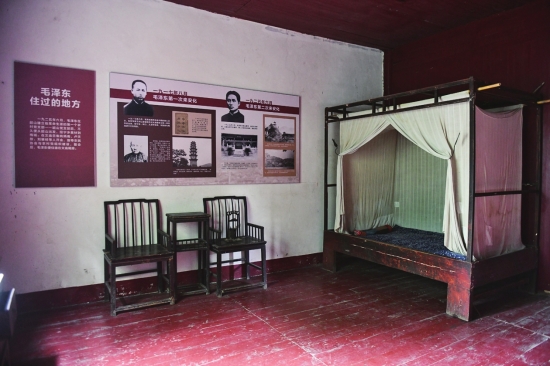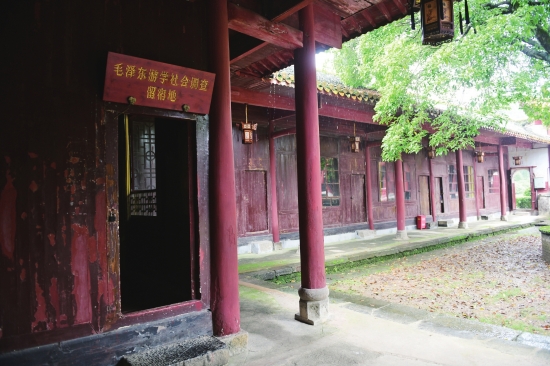Mao Zedong’s two trips to Anhua
2023-02-08
For Mao Zedong, 1917 was a year of great leap in his thoughts and vision.
In 1917, when Mao Zedong talked with his classmates, he proposed that a man should not only be satisfied with food, clothing and housing, but also connect the life ideal with the world.
In 1917, he published the “Research on Sports” in “LA JEUNESSE”, proposing that “we should sharpen our mind and toughen the body”. He wanted to go to the wider world and understand the society. This was the beginning of his Anhua social survey trip.

Before the Anhua trip in 1917, like most young people, Mao Zedong was full of desire to understand the world. When Mao Zedong and Xiao Zisheng set out, they were not ready to bring money. According to the archives of Anhua County Archives, they wore civilian clothes with butch haircut, and took an oil-paper umbrella, a baggage, spare clothes, washing supplies, a brush and an ink cartridge.
“Next summer, I started hiking in Hunan and visited five counties. A student named Xiao Yu (Xiao Zisheng) went with me. We traveled through these five counties and didn’t spend a copper coin. The farmers provided us with food and accommodation. Everywhere we went, we were treated and welcomed by the local people.” Mao Zedong once recounted his experiences at that time.
Besides asking for food at farmers’ houses, Mao Zedong and Xiao Zisheng also took advantage of their cultural advantages to help others write couplets and copybooks, and earn some traveling expenses.
“Next summer, I started hiking in Hunan and visited five counties. A student named Xiao Yu (Xiao Zisheng) went with me. We traveled through these five counties and didn’t spend a copper coin. The farmers provided us with food and accommodation. Everywhere we went, we were treated and welcomed by the local people.” Mao Zedong once recounted his experiences at that time.
Besides asking for food at farmers’ houses, Mao Zedong and Xiao Zisheng also took advantage of their cultural advantages to help others write couplets and copybooks, and earn some traveling expenses.

When arriving in Meicheng, Mao Zedong and Xiao Zisheng had no money. They went into a restaurant and ordered tea and breakfast priced at eight copper coins. After the meal, Xiao Zisheng let Mao Zedong write a survey journal, and he went to beg for money on the streets throughout Meicheng. However, he didn’t get enough money to pay for breakfast. So they used the money to buy some red paper and sent it to several stores such as “Ding Sheng Tai” and “Qian Yi Ji”, and got 30 copper coins in exchange. They paid the bill for the breakfast and had some money left.
In Meicheng, they visited Xia Mo’an, head of Quanxue Bureau in Anhuan (a local educational administrative institution) at that time. Xia thought highly of himself and did not want to talk with them, so Mao Zedong visited him three times. During the third visit, Xia Mo’an gave the first line of a couplet. Mao Zedong improvised the second line, which implied allusions, proper rhetoric and profound meaning, expressing his patriotic sentiment and sense of responsibility. Xia Mo’an was so amazed that he immediately treated him as a guest and let him to stay in Quanxue Bureau.
In Meicheng, they visited Xia Mo’an, head of Quanxue Bureau in Anhuan (a local educational administrative institution) at that time. Xia thought highly of himself and did not want to talk with them, so Mao Zedong visited him three times. During the third visit, Xia Mo’an gave the first line of a couplet. Mao Zedong improvised the second line, which implied allusions, proper rhetoric and profound meaning, expressing his patriotic sentiment and sense of responsibility. Xia Mo’an was so amazed that he immediately treated him as a guest and let him to stay in Quanxue Bureau.

In 1925, Mao Zedong came to Anhua again. This trip was more urgent and secretive than the last one. His revolutionary thoughts also became increasingly mature and firm in the past eight years of social practice.
In March 1927, Mao Zedong completed the “Report on an Investigation of the Peasant Movement in Hunan”, in which he praised the peasant movement in Anhua three times. Since then, Mao Zedong had completed several investigation reports one after another, continuously practicing his life ideal. The trips to Anhua started his initial social investigation and can be regarded as a shining starting point.
In March 1927, Mao Zedong completed the “Report on an Investigation of the Peasant Movement in Hunan”, in which he praised the peasant movement in Anhua three times. Since then, Mao Zedong had completed several investigation reports one after another, continuously practicing his life ideal. The trips to Anhua started his initial social investigation and can be regarded as a shining starting point.


